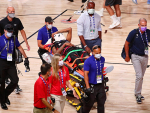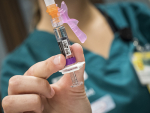Displaying items by tag: school of medicine
This study of ischemic stroke patients is the first to associate the neutrophil-lymphocyte ratio in patients with COVID-19 and ischemic stroke and stroke severity.
Tagged under
The entirely transparent mask can be worn as-is or modified with N95 cushioned filters and sensor arms that check for temperature and pulse.
Tagged under
UAB tops 22,500 students for the first time, featuring its highest retention rates in the history of the university.
Tagged under
- release
- college of arts and sciences
- school of nursing
- collat school of business
- school of optometry
- school of dentistry
- school of medicine
- school of education
- school of health professions
- school of public health
- honors college
- graduate school
- school of engineering
- office of the president
- office of the provost for student and faculty success
- enrollment management
Tagged under
Kimberly Hendershot, M.D., assistant professor in the UAB Division of Acute Care Surgery, has been named an associate member in the new American College of Surgeons Academy of Master Surgeon Educators™.
A study conducted by UAB investigators has outlined that Black individuals with heart failure have a worse prognosis, even after achieving biomarker-based heart failure treatment targets.
Tagged under
There is a narrow window of opportunity for successfully treating major cardiovascular events, and patients risk serious consequences if they wait for symptoms to get worse before seeking medical attention.
Tagged under
UAB’s exploratory Alzheimer’s Disease Research Center will address a coverage gap in the Deep South of the nation’s ADRC network.
Tagged under
These lipids may act as a biomarker for Type 1 diabetes and offer a therapeutic target to prevent the disease.
Tagged under
UAB is one of just 100 sites in the nation to receive such an antimicrobial stewardship designation.
Tagged under
UAB’s Center for Addiction and Pain Prevention and Intervention will conduct research that can be developed and translated into better treatments for addiction and pain.
Tagged under
- release
- school of medicine
- department of medicine
- division of infectious diseases
- department of psychiatry and behavioral neurobiology
- department of psychology
- department of neurobiology
- department of health behavior
- school of public health
- division of preventive medicine
- department of anesthesiology and perioperative medicine
- college of arts and sciences
In a new trial funded through UAB’s urgent COVID-19 research program, investigators are comparing the widely available steroid methylprednisolone with dexamethasone, which lowered risk of dying by one-third in a U.K. trial this summer.
A K23 grant from the National Institutes of Health will determine how to best improve growth in preterm infants.
Tagged under
Black people in the United States have the highest rates of colorectal cancer of any racial or ethnic group, according to the American Cancer Society.
Tagged under
A drug that inhibits the protease plasmin is hypothesized to reduce the infectivity and virulence of the virus, as measured by reduced need for hospitalization within a week.
Tagged under
Tagged under
A UAB sports medicine physician says the NBA bubble shows that masking and social distancing strategies are working to control coronavirus.
Tagged under
The flu vaccine can prevent the flu entirely, or limit the severity and duration of a bout with the disease.
Drs. Vickers and Pisu will use a $3 million, five-year National Institute on Minority Health and Health Disparities grant to study barriers that may exist for GI cancer patients to access quality cancer surgery in Alabama and Mississippi.
Tagged under



















